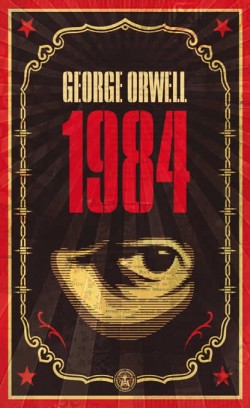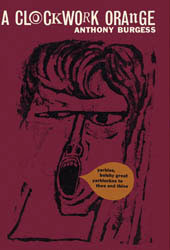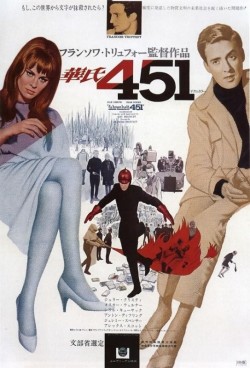
3 Novels on Dystopia (noun):
a society characterized by human misery, as squalor, oppression, disease, and overcrowding
Nineteen Eighty-Four (sometimes written 1984) is a 1949 dystopian novel by George Orwell about an oligarchical collectivist society. Life in the Oceanian province of Airstrip One is a world of perpetual war pervasive government surveillance and incessant public mind control. The individual is always subordinated to the state, and it is in part this philosophy which allows the Party to manipulate and control humanity. In the Ministry of Truth protagonist Winston Smith is a civil servant responsible for perpetuating the Party’s propaganda by revising historical records to render the Party omniscient and always correct, yet his meagre existence disillusions him to the point of seeking rebellion against Big Brother eventually leading to his arrest, torture, and conversion. […]
A Clockwork Orange is a 1962 dystopian novella by Antony Burgess. Burgess gave three explanations for the origins of the title. In a prefatory note to A Clockwork Orange: A Play with Music,  Burgess wrote that the title was a metaphor for “…an organic entity, full of juice and sweetness and agreeable odour, being turned into an automaton.”In his essay, “Clockwork Oranges” , Burgess asserts that “this title would be appropriate for a story about the application of ‘Pavlovian’ or mechanical laws to an organism which, like a fruit, was capable of colour and sweetness”. This title alludes to the protagonist’s positively conditioned responses to feelings of evil which prevent the exercise of his free will. With this technique, the subject’s emotional responses to violence are systematically paired with a negative stimulation in the form of nausea caused by an emetic medicine administered just before the presentation of films depicting violent, and “ultra-violent” situations. Written from the perspective of a seemingly biased and unapologetic protagonist, the novel also contains an experiment in language: Burgess creates teenage slang of the not-too-distant future. […]
Burgess wrote that the title was a metaphor for “…an organic entity, full of juice and sweetness and agreeable odour, being turned into an automaton.”In his essay, “Clockwork Oranges” , Burgess asserts that “this title would be appropriate for a story about the application of ‘Pavlovian’ or mechanical laws to an organism which, like a fruit, was capable of colour and sweetness”. This title alludes to the protagonist’s positively conditioned responses to feelings of evil which prevent the exercise of his free will. With this technique, the subject’s emotional responses to violence are systematically paired with a negative stimulation in the form of nausea caused by an emetic medicine administered just before the presentation of films depicting violent, and “ultra-violent” situations. Written from the perspective of a seemingly biased and unapologetic protagonist, the novel also contains an experiment in language: Burgess creates teenage slang of the not-too-distant future. […]
Fahrenheit 451 a dystopian novel by Ray Bradbury was first published in a shorter form as “The Fireman”. The short novel presents a future American society in which the masses are hedonistic and critical thought through reading is outlawed.  The central character, Guy Montag, is employed as a “fireman” (which, in this future, means “bookburner”). The novel’s title refers to the supposed temperature at which book paper combusts. Although sources contemporary with the novel’s writing gave the temperature as 450 °C (842 °F),Bradbury is believed to have thought “Fahrenheit” made for a better title; however, in an introduction to the 40th anniversary edition of the novel, Bradbury states that a person he spoke with at the local fire department said “Book-paper catches fire at 451 degrees Fahrenheit”. The “firemen” burn them “for the good of humanity”. Written in the early years of the Cold War, the novel is a critique of what Bradbury saw as issues in American society of the era.
The central character, Guy Montag, is employed as a “fireman” (which, in this future, means “bookburner”). The novel’s title refers to the supposed temperature at which book paper combusts. Although sources contemporary with the novel’s writing gave the temperature as 450 °C (842 °F),Bradbury is believed to have thought “Fahrenheit” made for a better title; however, in an introduction to the 40th anniversary edition of the novel, Bradbury states that a person he spoke with at the local fire department said “Book-paper catches fire at 451 degrees Fahrenheit”. The “firemen” burn them “for the good of humanity”. Written in the early years of the Cold War, the novel is a critique of what Bradbury saw as issues in American society of the era.

Recent Comments
pete says,
thank you very much this was very helpfulH M Yamada says,
There is something dire, dangerous and mysteriously compelling about these ...
Robert Horvitz says,
Belated thanks for citing my work! I have a newer ...
article/about says,
Berber as well as Arab nomads took their caravans of ...
Betty Wood says,
Sometimes when I create something beautiful I feel like someone ...